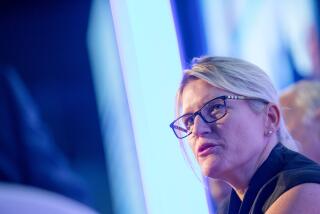Yahoo CEO has credibility problem
- Share via
Jerry Yang isn’t like Michael Dell, Steve Jobs and other high-profile executives who returned to rescue the companies they founded. Yang, Yahoo Inc.’s new chief executive, never left.
And that’s part of his credibility problem -- not just with outside investors hoping for a more radical management shake-up than they got this week, but also with current and former employees who have felt frustrated as they’ve watched rivals start to eat Yahoo’s lunch.
Several ex-Yahooers said that an aversion to risk and a quarter-to-quarter mentality had crept in as the company super-sized itself in recent years. As archrival Google Inc. grew to dominate the Internet-advertising business, Yahoo appeared to hesitate. As others pulled the trigger on acquisitions of dynamic Web companies -- Google bought YouTube, and News Corp. bought MySpace -- Yahoo seemed to deliberate too long. Whether or not Yang was running the company, such people said, it has happened on his watch.
Under heavy criticism from disappointed investors, Yahoo announced Monday that Yang, 38, had taken over as CEO from Terry Semel, 64, the veteran Hollywood executive who arrived in 2001 and helped refocus the company in the aftermath of the dot-com stock collapse. In Yang’s first move, he tapped former chief financial officer and rising star Susan L. Decker as president to help him restore confidence among Wall Street, advertisers and employees.
Investors initially embraced the changes, bidding up Yahoo shares in after-hours trading Monday, soon after the announcement. But on Tuesday the stock dropped 49 cents to $27.63, partly because of analysts’ cool reaction and partly because of the company’s statement that it wanted to stay independent. Some investors had been hoping that Yahoo’s turmoil might lead it to put itself up for auction.
“Jerry Yang is widely acknowledged as a visionary -- he built something out of nothing,” Standard & Poor’s analyst Scott Kessler said Tuesday. “But he’s not really a manager and never has been, so there’s a level of skepticism about this news.”
Yang has long carried the title “chief Yahoo” and has been responsible for long-term strategy, not management, at the Sunnyvale, Calif.-based company. In fact, other than an administrative assistant, he has had no subordinates reporting to him, said a former executive who, like other ex-employees interviewed for this story, declined to be identified because they retained some personal or business ties to the company.
To lead the charge against Google and other competitors, Kessler said, Yang will have to “rally the troops and get people excited.”
As CEO, he also will be the public face of Yahoo, mainly responsible for articulating its vision -- a role he has left to others in the past. A former Yahoo executive who admires Yang said that unlike some other Silicon Valley executives, Yang and co-founder David Filo “have not been that interested in being in the media.”
Yang was not available for an interview Tuesday, a Yahoo spokeswoman said.
“Jerry has been in the trenches at Yahoo since day one, and his tremendous passion and work ethic has continued throughout his 12 years here,” the company said in a statement, adding that Yang “has played a key role in forming the company strategy and driving our business forward.”
Few people who know Yang doubt his competitive fire, least of all friends such as former Yahoo President Jeff Mallett, who has seen Yang transform himself from an utter hacker into a golfer who shoots in the low 80s.
“If Jerry doesn’t know how to do something, he throws himself into it,” said Mallett, chairman of Snocap, a tech company. “He doesn’t want to catch up to you -- he wants to beat you.”
That kind of determination, in Mallett’s view, makes Yang the right person for the top job now.
Google’s explosive growth has set “a wickedly high benchmark” for Yahoo, Mallett said, but the pace of change in the industry means that no advantage is insurmountable. It was only in 2006 that Google’s annual profit outpaced Yahoo’s.
To some observers, Yahoo’s main challenges are to narrow its focus and speed up development of new products and services. Kessler told the Associated Press that the large Santa Monica office that houses Yahoo’s media operations might be a target for closure. But a Yahoo spokeswoman said that was not the case.
Yahoo’s new Panama search-advertising technology shows promise, Kessler said. But rather than going head-to-head with Google on search, he said the company might devote more energy to becoming “the anti-Google” by further developing content-sharing partnerships with companies such as Viacom Inc. that have been angered by what they regard as Google’s somewhat cavalier attitude toward intellectual property.
“There’s no shortage of ideas there, but sometimes a lack of ability to see them through,” said a former executive who left Yahoo recently and was still rooting for the company to succeed. “They move like molasses sometimes.”
Another ex-Yahooer said that what some people mistake for excessive caution on Yang’s part is actually discipline.
“Is it a cool technology, or is it a business?” the person asked, adding that Yang, to his credit, has a good record of being able to distinguish between the two.
Yahoo may be involved in too many projects to successfully run all of them, Mallett said, but he added that it was a cyclical problem for all big companies in a fast-changing industry.
“Every five years, you probably need to shoot the weak ones and focus on the strong ones,” Mallett said. “It’s pruning, and it’s a natural process.”






